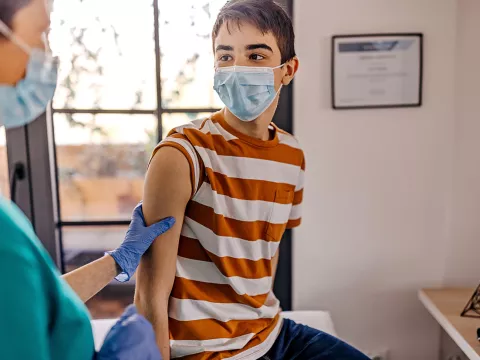- AdventHealth

Choose the health content that’s right for you, and get it delivered right in your inbox.
Right now, over 20% of COVID-19 cases in the United States are in children, and while some children who become infected never show any signs or symptoms of illness, more kids here have died from COVID-19 in the last year than have died from other illnesses that have had vaccines available, such as the flu or chickenpox.
Now that the Pfizer vaccine is available to children ages 12 and older, we encourage parents to weigh the possibilities of all scenarios when it comes to making the decision for your child to get vaccinated to protect against COVID-19, and that includes looking at the risks associated with infection compared to the safety and efficacy of the vaccine.
The Risk of COVID-19 For Kids
Since we’ve be en in the pandemic for over a year, we now know that overall, children are getting less ill from COVID-19 compared to older adults. However, this doesn’t mean some kids who become infected aren’t at risk .
Many children who contract COVID-19 are being hospitalized for their symptoms, and according to the American Academy of Pediatrics, more than 340 children have died. There’s also a growing risk of a COVID-linked disorder called multisystem inflammatory syndrome in children, which can impact the heart along with other organs.
Research shows that the COVID-19 vaccines are highly effective at stopping people from getting COVID-19 and preventing serious illness in those who do become infected. The Centers for Disease Control and Prevention (CDC) says the vaccination can also help prevent children from spreading the illness to others.
The COVID-19 Vaccine is Safe and Effective for Kids
Extensive clinical trials were conducted with thousands of participants, including those 12 and older, to evaluate the COVID-19 vaccine and generate scientific data and other information for the Food and Drug Administration (FDA) to determine its safety and effectiveness.
In March, the study that led to the Pfizer vaccine’s emergency use authorization (EUA) for children began. The study had over 2,000 12- to 15-year-old children participate. Of all the participants who received the vaccine, none of the children got sick with COVID-19. This means that, in the study, the vaccine worked even better in children than it does in adults.
Your Child May Experience Side Effects
It’s important to know that your child cannot get COVID-19 from a vaccine. However, children may experience side effects and feel a bit under the weather for a few days, but that’s a sign their body is building up defenses against COVID-19.
Kids have reported the same side effects as adults after they’ve gotten the second dose of the Pfizer vaccine. Common side effects include:
- Chills
- Fever
- Headache
- Muscle ache
- Nausea
- Pain, redness or swelling in your arm where you got the shot
- Tiredness
To soothe a sore arm, apply a cool, wet washcloth to the area. To help them feel better with a fever, give them extra fluids and dress them in lightweight clothing. In addition, the CDC says it’s OK to take over-the-counter medicine to ease discomfort after the shot, but your child should not take any beforehand.
How Can My Child Get a COVID-19 Vaccine?
Many area county health departments are offering vaccines to those ages 12 and older. Those who wish to be notified when AdventHealth will be having a community vaccine event can visit CoronavirusVaccineAlerts.com. For more coronavirus vaccine information from our medical experts, visit our Coronavirus Vaccine Resource Hub.



